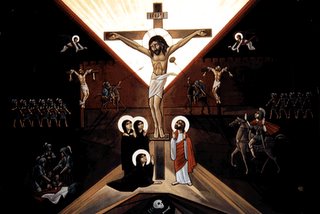Christi Crux est mea Lux
 Station at Saint Nicholas's in Carcere
Station at Saint Nicholas's in CarcereThe Station is held in a church built on the ruins of two pagan temples (on right, columns from one of these can be seen) and the Forum Holitorium. The church is dedicated to St Nicholas on account of the number of Greeks who lived in the area. It bears the name in carcere because there was formerly a dungeon on this site. But the Station dates only from the 8th century. Beforehand, it was held at the church of St Lawrence in Lucina. This church and its earlier Station church of St Lawrence's (and thus the Tridentine Stational liturgy) are both replete with allusions to the light of Christ overcoming the darkness of paganism. Hence, today's reflection is about light and darkness.
There is a Latin motto, "Christi crux est mea lux", 'The Cross of Christ is my light' that was written into the cross-shaped pendent lights (designed by A.W.N. Pugin) in the refectory of a secular seminary I used to attend. I used to look at these lights and ponder the words so boldly inscribed on the cruciform chandeliers.
Truly, Christ Crucified is our light; the splendour of truth and the radiance of love shines from the Cross, the "light of the world" (Jn 8:12). His light shines upon us, but do we reflect it, like the moon reflects the light of the sun? How often our sinfulness, our human weakness and pettiness obscures the light. As Hans Urs von Balthasar puts it in this lovely little aphorism:

"The arrogant person is like a black object. In order to acquire some energy and thus be able to 'shine', he sucks up all light into himself, not knowing that precisely because of this he no longer reflects a single ray and so is wholly darkness. The humble person is already bright: whatever he receives he passes on, and he 'shines' precisely because he doesn't clutch at things. Because he readily transmits the borrowed light that falls on him, he becomes light. Love and mission are one."
Hence, the Lord says in Matthew 5:16, "Let your light so shine before men, that they may see your good works, and glorify your Father who is in heaven." We glorify God by reflecting his love, the love that is given us in Christ. This path of humility that gives all in love to God and others is most perfectly trod by Our Blessed Mother. She is the one to whom we can ask for help and guidance.
Today, on the cusp of Passiontide, let us ask Mary to be with us as we accompany the Lord on his Via Dolorosa and learn from her the Via Humilitatis.







0 Comments:
Post a Comment
<< Home